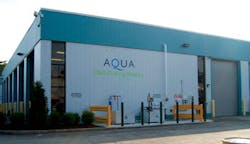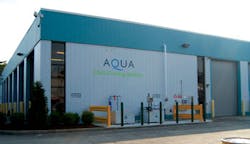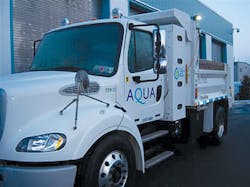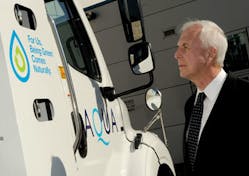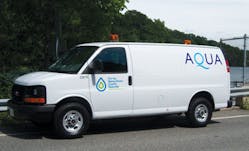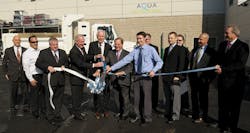By Nicholas DeBenedictis
In a world of 24-hour news cycles and continuous knowledge sharing, businesses and consumers alike have more information and tools than ever before to impact change. The future of our environment remains a top concern for many Americans, and we are continuing to see alternative fuel power sources, such as wind and solar power, make their way into our backyards.
Consumers have been empowered to help reduce their ecological footprint through a variety of initiatives, such as increased accessibility to recycling programs, automated residential heating and air conditioning units, and incentives for purchasing energy-efficient appliances. The availability of alternative-fuel-powered vehicles is also increasing as demand for these products rises and more fueling stations are built.
On a larger scale, businesses are becoming more conscientious and concerned with how their operations impact the environment. So how can companies incorporate measures to reduce their environmental impact while not cutting into their bottom line or compromising customer satisfaction?
Utilizing an alternative fuel source, such as compressed natural gas (CNG), for a company fleet is a good place to start. CNG is an alternative to gasoline that is made by compressing natural gas to less than 1 percent of its volume at standard atmospheric pressure. CNG is odorless, colorless and tasteless. Made up of mostly methane, it is drawn from drilled natural gas wells or in conjunction with crude oil production. Dating back to World War II, natural gas vehicles are proven to be safe and have many commercial and industrial uses.
Driving Sustainability
While there is still plenty of room for growth, alternative sources of fuel such as CNG are increasing in popularity. Today, natural gas powers more than 12 million vehicles in the U.S., and its use has increased every year since 2000. Currently, there are 500 public CNG fueling stations across the country.
Beyond the environmental benefits, utilizing a CNG-fueled fleet offers several important operational and financial advantages for businesses:
- CNG vehicles are as safe as traditional gasoline-powered vehicles, thanks to strict safety standards and -- according to U.S. EPA -- the narrow flammability range of compressed natural gas.
- In the event of a spill or accidental release, CNG does not pose a risk to land or water because it is nontoxic. When compared to gasoline, it disperses rapidly, minimizing ignition risk.
- CNG costs about 50 percent less than gasoline or diesel, emits up to 90 percent fewer emissions than gasoline, and there is an abundant supply right here in the U.S.
A Case Study: Putting CNG into Motion
Aqua America, one of the nation's largest publicly-traded water and wastewater utilities, has been a longtime supporter of CNG vehicles. The company purchased its first bi-fuel pickup truck in 1997 and expects to have 90 vehicles in operation within the next five years. Its growing fleet of these automobiles currently includes 19 vans, two bi-fuel pickup trucks and six dump trucks. Fourteen of Aqua's CNG vans were partially funded through an Alternative Fuels Incentive Grant (AFIG) from the Pennsylvania Department of Environmental Protection (DEP), which was awarded in November 2013. These vans are used in the inspection of water and wastewater pipeline restoration work.
In 2012, an initial investment of $130,000 was made in a time-fill station at Aqua's Springfield operations center in Delaware County, Pa. Plans are also in the works to install time-fill stations at the company's Willow Grove, Montgomery County, and West Chester, Chester County, operations centers throughout the greater Philadelphia region. To date, Aqua has invested $675,000 in CNG through vehicle purchases and infrastructure upgrades and expects a rapid payback because of fuel cost savings.
To supplement its growing CNG fleet, the Aqua Southeastern Pennsylvania division is continuing to transition all of its diesel-powered vehicles and equipment to B5 biodiesel, which requires no engine modifications or capital investment. A biodiesel blend, B5 is a form of diesel fuel manufactured from vegetable oils, animal fats or recycled restaurant greases. It is safe, biodegradable and produces less air pollutants than petroleum-based diesel.
As demand for alternative fuel sources continues to grow, the availability of fueling stations and new technologies to deliver alternative fuel products will continue to evolve. As Aqua continues to transition its fleet, companies are encouraged to consider using compressed natural gas as an alternative fuel source and explore other avenues to reduce environmental impact. When we all work together, small steps effect big changes.
About the Author: Nicholas DeBenedictis was elected chairman of Aqua America, Inc. (formerly Philadelphia Suburban Corporation) in May 1993, ten months after joining the corporation as its president and CEO. He served as senior VP of corporate and public affairs for PECO Energy and was president of the Greater Philadelphia Chamber of Commerce. He held two Pennsylvania cabinet positions: Secretary of the Department of Environmental Resources (1983-1986) and Director of the Office of Economic Development (1981-1983). DeBenedictis received a bachelor's degree in business administration from Drexel University in 1968 and a master's degree in environmental engineering and science from Drexel in 1969.
Aqua America, Inc. is one of the largest publicly-traded water and wastewater utilities in the U.S., serving approximately three million people in Pennsylvania, Ohio, North Carolina, Illinois, Texas, New Jersey, Indiana, and Virginia. It is listed on the New York Stock Exchange under the ticker symbol WTR.
***************
Aqua Opens Willow Grove CNG Fueling Station
On Oct. 30, 2014, Aqua Chairman and CEO Nicholas DeBenedictis joined officials from Pennsylvania's Commonwealth Financing Authority, the Pennsylvania Department of Community and Economic Development and others as they cut the ribbon on Aqua's second and newest time-fill CNG fueling station in Willow Grove, Montgomery County.
The station will support the company's growing fleet of vehicles that use CNG, a clean-burning fuel alternative. The fleet has been partially funded through grants from the DEP.
The $200,000 station was funded in part by a $35,000 Pennsylvania Alternative and Clean Energy grant from the Pennsylvania Financing Authority. The station has the capacity to fill 12 vehicles simultaneously.
More WaterWorld Current Issue Articles
More WaterWorld Archives Issue Articles
